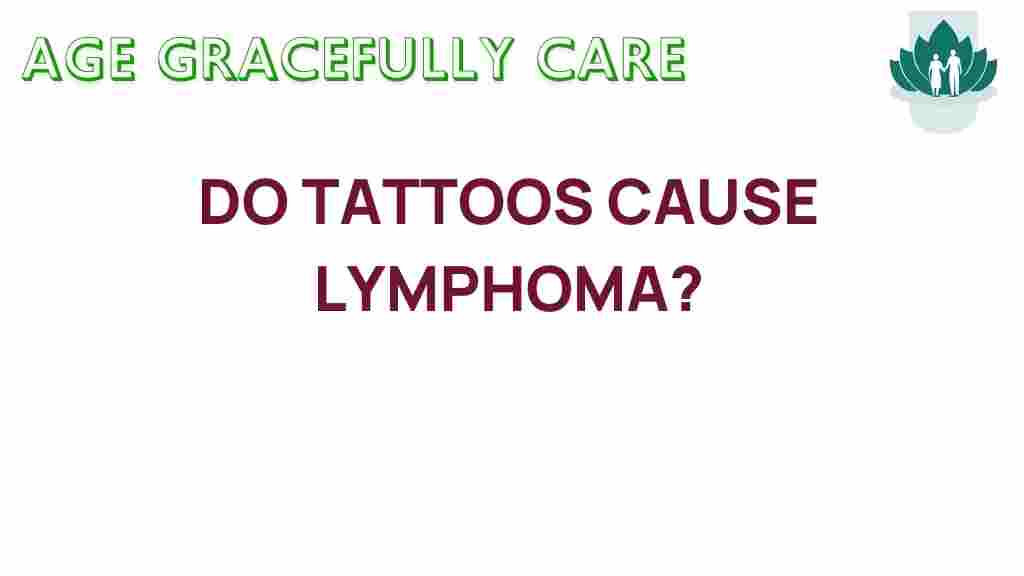Do Tattoos Trigger Lymphoma? Unraveling the Controversy
Tattoos have become a form of body art embraced by millions around the world. As their popularity grows, so too does the concern over potential health risks associated with tattooing. One of the most pressing questions is whether tattoos can trigger lymphoma, a type of cancer that affects the lymphatic system. In this article, we will delve into the relationship between tattoos and lymphoma, explore the health risks involved, and examine the current medical research on the subject.
Understanding Lymphoma and Its Types
Lymphoma is a cancer that originates in the lymphatic system, which is an integral part of the immune system. It is categorized primarily into two types:
- Hodgkin Lymphoma: Characterized by the presence of Reed-Sternberg cells, this type is usually more treatable.
- Non-Hodgkin Lymphoma: A diverse group of blood cancers that includes various subtypes, some of which can be more aggressive.
Both types of lymphoma can present similar symptoms, including swollen lymph nodes, unexplained weight loss, fever, and night sweats. But what role, if any, do tattoos play in the development of these conditions?
The Link Between Tattoos and Health Risks
While the relationship between tattoos and lymphoma is still a topic of debate, several health risks associated with tattoos have been identified. These include:
- Allergic Reactions: Some individuals may experience allergic reactions to tattoo inks, leading to skin irritation or rashes.
- Infections: If proper hygiene practices are not followed during the tattooing process, there is a risk of infections.
- Skin Cancer: Although there is no direct evidence linking tattoos with skin cancer, the long-term effects of tattoo ink exposure are still under investigation.
It’s important to note that not everyone who gets a tattoo will experience these health risks. However, individuals with compromised immune systems, such as those undergoing treatment for cancer, may be at a higher risk.
The Research Landscape
When it comes to tattoos and lymphoma, medical research is still evolving. Here are some key points from recent studies:
- Studies on Tattoo Inks: Research has shown that some tattoo inks contain heavy metals and other harmful substances that might be linked to health issues, including lymphoma.
- Case Reports: Isolated case reports have documented instances where tattoos were found to be associated with the development of lymphomas, particularly in individuals who already had risk factors.
- Need for More Research: Experts agree that more extensive and longitudinal studies are needed to draw definitive conclusions about the relationship between tattoos and lymphoma.
While some studies suggest a potential link, the evidence is not conclusive. The dermatology community emphasizes the need for proper tattooing practices to minimize health risks.
Safety Precautions When Getting a Tattoo
If you are considering getting a tattoo, it is essential to prioritize safety. Here are steps you can take to reduce potential health risks:
- Choose a Reputable Artist: Ensure that your tattoo artist is licensed and follows strict hygiene practices.
- Check Ink Ingredients: Inquire about the ingredients in the tattoo ink and select inks that are free from harmful substances.
- Aftercare: Follow proper aftercare instructions to prevent infections and promote healing.
By taking these precautions, you can enjoy your body art while minimizing health risks.
Troubleshooting Common Concerns
Many individuals have concerns about tattoos, especially regarding their potential link to serious health conditions. Here are some common concerns and how to address them:
- Concern: Will my tattoo increase my cancer risk?
Response: Current research does not conclusively link tattoos to an increased risk of lymphoma. However, staying informed and choosing safe practices is essential. - Concern: What if I have a bad reaction to the ink?
Response: If you experience any unusual symptoms after getting a tattoo, such as excessive swelling or persistent rash, consult a healthcare professional immediately. - Concern: Should I avoid tattoos altogether?
Response: While tattoos carry some risks, many people get them without any issues. Assess your health status and consult with a doctor if you have specific concerns.
Understanding these concerns can help you make informed decisions about body art and your health.
Conclusion: Making Informed Decisions About Tattoos
In conclusion, the relationship between tattoos and lymphoma remains a complex and debated topic. While there are potential health risks associated with tattoos, including allergic reactions and infections, definitive evidence linking tattoos to lymphoma is lacking. Ongoing medical research will continue to shed light on this issue.
If you are considering getting a tattoo, ensure that you prioritize safety by choosing a reputable artist, being informed about ink ingredients, and following proper aftercare practices. Additionally, if you have existing health conditions or concerns about your immune system, it is always wise to consult a healthcare professional.
Ultimately, tattoos are a personal choice, and understanding the potential health risks can empower you to make informed decisions about your body art. For more information on skin health and safety, visit American Academy of Dermatology.
For those curious about further reading on the health implications of body art, check out this resource.
This article is in the category Health and created by AgeGracefullyCare Team
